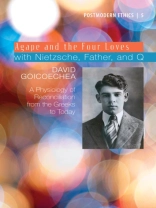Goicoechea explains Nietzsche’s thesis that the agapeic love of Jesus is humankind’s highest affirmation, even for sinners like the author’s father, Joe Goicoechea, who lived it out existentially. Already before the Q scholars, Nietzsche saw this love as the essence of the Sermon on the Mount and based his philosophy upon it. Throughout the Catholic tradition agape fulfilled the affection of Empedocles, the eros of Plato, the friendship of Aristotle, and the agape of Plotinus. While, as Anders Nygren shows, modernists protested such syntheses, now postmodernists once again let agape and the four loves contribute to one another.
Об авторе
David L. Goicoechea is Professor Emeritus of Philosophy at Brock University, St. Catharines, Ontario. He has published widely in the areas of philosophy of love, existentialism, philosophy of religion, postmodernism, and the history of philosophy.












